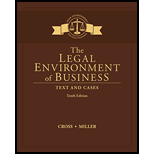
Case summary: The Plaintiff NIL filed a suit against the defendant HSI in the Texas state court. The return of service showed that the process has been served on the commissioner of Texas state as soon as it was delivered to JK, a defendant in person. As the defendant didn’t respond to the service of process, the decision was given in favor of the plaintiff. After 5 months, the defendant filed a motion for a new trial claiming that they were not served with the process in severe compliance with the service of process.
To Explain: (a) The applicability of assertion made by the defendant that JK didn’t have the authority to accept the process on their behalf.
To Find: (b) The person responsible for ensuring that the service of process is accomplished properly.
Want to see the full answer?
Check out a sample textbook solution
Chapter 3 Solutions
The Legal Environment of Business: Text and Cases (MindTap Course List)
- I want the correct answer with accounting questionarrow_forwardMartinez Company plans to sell 8,500 orange beach umbrellas during May, 6,800 in June, and 8,500 during July. The company keeps 16.75% of the next month's sales as ending inventory. How many units should Martinez produce during June? (Rounding to whole units since you can't produce partial umbrellas). a. 5,374 b. 6,200 c. 7,157 d. Not enough information to determine.arrow_forwardNo WRONG ANSWERarrow_forward
 BUSN 11 Introduction to Business Student EditionBusinessISBN:9781337407137Author:KellyPublisher:Cengage Learning
BUSN 11 Introduction to Business Student EditionBusinessISBN:9781337407137Author:KellyPublisher:Cengage Learning Essentials of Business Communication (MindTap Cou...BusinessISBN:9781337386494Author:Mary Ellen Guffey, Dana LoewyPublisher:Cengage Learning
Essentials of Business Communication (MindTap Cou...BusinessISBN:9781337386494Author:Mary Ellen Guffey, Dana LoewyPublisher:Cengage Learning Accounting Information Systems (14th Edition)BusinessISBN:9780134474021Author:Marshall B. Romney, Paul J. SteinbartPublisher:PEARSON
Accounting Information Systems (14th Edition)BusinessISBN:9780134474021Author:Marshall B. Romney, Paul J. SteinbartPublisher:PEARSON
 International Business: Competing in the Global M...BusinessISBN:9781259929441Author:Charles W. L. Hill Dr, G. Tomas M. HultPublisher:McGraw-Hill Education
International Business: Competing in the Global M...BusinessISBN:9781259929441Author:Charles W. L. Hill Dr, G. Tomas M. HultPublisher:McGraw-Hill Education





